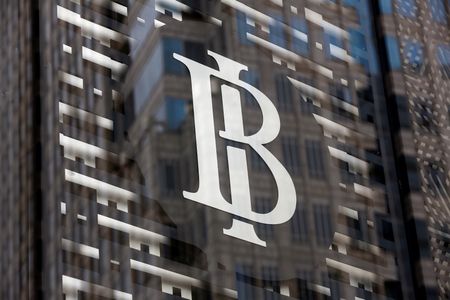By Rahul Trivedi
BENGALURU (Reuters) -Bank Indonesia will hold its key interest rate steady again on Wednesday to limit pressure on the rupiah while it presses commercial banks to lower lending rates and assess the impact of previous rate cuts on the economy, a Reuters poll of economists showed.
Last month, when BI unexpectedly paused its easing cycle, Governor Perry Warjiyo said the priority was to get private banks to reduce lending rates to ease pressure on businesses and households who are struggling due to weak domestic demand and high borrowing costs.
That, along with the rupiah’s near 4% drop against the U.S. dollar for the year, one of the weakest among emerging market currencies, suggests policymakers are likely to stay on hold again this month.
But some economists caution the chances of BI defying expectations on Wednesday remain high as it has gone against the consensus view in the last three meetings.
Governor Warjiyo said last month there is still room for further rate cuts as inflation was expected to stay low through 2026. Inflation rose to 2.86% in October, its fastest pace this year, but remained within the central bank’s target range of 1.5%-3.5%.
A majority of economists, 24 of 30, surveyed in the November 10-17 Reuters poll expected BI to leave its benchmark seven-day reverse repurchase rate unchanged at 4.75% when the two-day meeting concludes on November 19. The rest saw a 25 basis point cut.
The overnight deposit and lending facility rates were also expected to be kept at 3.75% and 5.50%, respectively.
“Bank Indonesia will be faced with a delicate balancing act and our call is for a dovish hold. There is certainly no reversal from their pro-growth stance, but we expect persistent currency underperformance to shift the policy calculus,” Jing Yi Tan, market economist at Mizuho Bank Ltd, said.
“They will also acknowledge that instead of pulling the rate-cut lever in a choked system, there is more plumbing work needed to improve policy transmission as lending rates remain sticky,” she added.
BI has lowered its benchmark rate by a total of 150 basis points since September last year but banks have passed on only 15 basis points of that reduction this year.
While a pause appears certain at this meeting, a strong majority of economists, 21 of 24, forecast the benchmark rate to fall 25 basis points to 4.50% next month. One expected a 50 basis point cut and two predicted no change from 4.75%.
ANZ’s Krystal Tan, who expects a cut next month, said: “BI is expected to retain an easing bias, with further rate cuts considered a matter of timing given still sluggish domestic demand and lackluster loan growth.”
Looking ahead, 17 of 22 economists expected the benchmark rate to fall by 50 basis points to 4.25% by the end of Q1 2026. Three predicted it to fall 25 basis points and two saw a fall of 75 basis points to 4.00%.
(Other stories from the November Reuters global economic poll)
(Reporting by Rahul Trivedi; Polling by Veronica Khongwir and Vijayalakshmi Srinivasan; Editing by Vivek Mishra, Hari Kishan, William Maclean)











